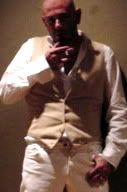 Oath of The Horatii, Jacques-Louis David, Musee du Louvre
Oath of The Horatii, Jacques-Louis David, Musee du LouvreProfessor Alan Hyde's paper, 'Our Homosocial Constitution: Some Sexual and Political Themes in Paintings Admired by the Founding Fathers', is a fascinating journey into the heads of some of the authors of our Constitution. The premiss asks us to see the Constitution as, primarily, Thomas Jefferson would have when helping to write our nation's primary document. Hyde speaks of a 'visual culture' which for all of us is a unique perspective. No person may actually view anything viewed by another, we must instead depend on our explanation of what we see, and are therefore limited to words, whether oral or written. We are asked then to attempt to 'see' how Jefferson was influenced and promoted the ideals set forth in late eighteenth century French paintings, often inspired by the neoclassical views of Greece and Rome, and perhaps viewed at the time not for their artistic value but for the political ideals set-forth in the image. Jacques-Louis david was the master of this historical genre and influenced much of Europe and the foundling America. We are introduced to the paintings which Jefferson had copies made for Monticello. The inventory, according to Hyde, is telling. What did Jefferson's view bring to our Constitutional society? A new social order in which a primarily male aesthetic blossomed and in which women played only a supporting role. Hyde points out that this was the first break from a long tradition of elevating women with "...an objectifying male gaze that often placed a woman as the central object of desire." Consequently, the Constitution came to represent a view of the world in which a fraternity between men replaced the family as a model for society at large.
 The Death of Socrates, Jacques-Louis David, Musee du Louvre
The Death of Socrates, Jacques-Louis David, Musee du LouvreThis may sound an ideal to the average gay man. I assure you it is not! David and his like must now be viewed for their artistic merit and, perhaps, an appreciation of their political views of the past but with a clear realization of the huge limitations such a moral and ethical code would now impose. If we attempt to live with the Constitution as (possibly? probably?) envisioned by Jefferson our GLBT communities will be as replaceable and as defunct as women were in his eighteenth century Enlightenment thought. The Constitution becomes a static document capable of relevance only to those who see the world in this most conservative and rigidly prejudicial manner, the best contemporary maxim for which is simply: 'the Good Ol' Boys' Club'. Don't underestimate the devotion still held by many for this model of government, it is enshrined in the fundamentalist hierarchy of the current Republican party. Our living, progressive document transcending era and speaking still to successive generations of Americans, interpreting modern societal experience, is essentially threatened to all our detriment, with swift erosion if not utter annihilation. The 'New' Supreme Court, fast approaching, will greatly determine how our Constitution comes to be viewed. The importance of which type of document we consider our Constitution to be is now telling and it will become increasingly fundamental to our liberty - or lack thereof.
Professor Hyde's essay, fully annotated, may be found at: http://www.andromeda.rutgers.edu/~hyde/homo.htm#N_1_
OR, click the title of this article above (La Vie en Rose) to take you directly to Hyde's page.


No comments:
Post a Comment